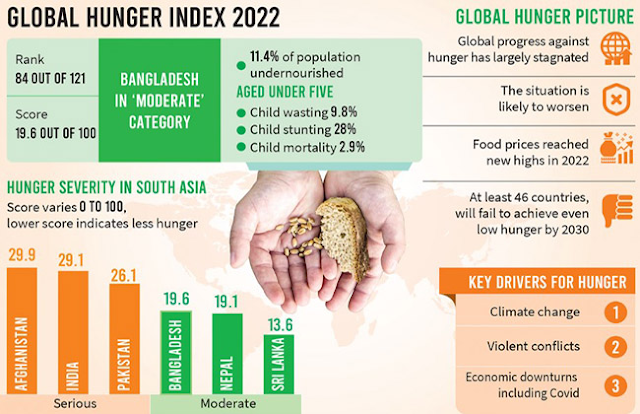SALEEM SAMAD
Bangladesh ranked 84th, out of 121 assessed countries on the 2022 Global Hunger Index (GHI). With an overall score of 19.6 (2022), the level of hunger in Bangladesh has been categorised as “moderate”.
On the eve of World Food Day (October 16), the launch of the 2022 GHI amid global crises and the war in Ukraine is putting global food security in peril, and the worst impacts are being felt by the very poorest.
Among South Asia, India, Pakistan, and Afghanistan are among the worst-performing countries in the region.
The GHI that tracks and measures hunger across the world says that malnutrition among children under five years in Bangladesh has slightly improved.
The country has gradually improved its ranking from 33.9 (2000), 31.3 (2007), 26.3 (2014) and 19.6 in 2022.
The report that has used the fifth National Family Health Survey (NFHS-5) and FAO (Food and Agriculture Organisation of the United Nations) Food Security Indicators as its sources for Bangladesh has highlighted that child wasting (low-weight-for-height) rate in Bangladesh, at 9.8 per cent, is satisfactory but still lots of effort needed to touch the target of “Zero Hunger” of Sustainable Development Goals (SDG) by 2030.
Despite Bangladesh being a moderate hungry country, but has fared well in undernourishment, child wasting and child stunting.
There are several reasons for the disruption, Bangladesh and other countries have failed its reach food autarky.
Some 50 nations that rely on Russia and Ukraine for the bulk of their wheat imports — including Bangladesh, Egypt, Iran, and Turkey — have been scrambling to find alternative suppliers, according to the GHI 2022 Report.
Spiralling food prices and global supply chain disruptions precipitated by the Ukraine war, the COVID-19 pandemic, climate change, and regional conflicts have worsened hunger for millions of people, requiring humanitarian and resilience-building responses to be urgently scaled up.
Incidentally, Bangladesh imports wheat from both Ukraine and Russia. Bangladesh’s food import is the lowest among countries having food shortages. Eritrea tops the list of dependencies on the external food supply in Ukraine and Russia.
The report mentions that there is another prime reason for the increase in food grain requirement in Bangladesh because of hosting more than one million Rohingya refugees since 2017.
Bangladesh took efforts in amplifying longstanding structural deficiencies in the global food system, which is inadequate for sustainably ending poverty and hunger as envisaged by the United Nations’ 2030 Agenda.
Within a global food system that has fallen short of sustainably ending poverty and hunger, citizens are finding innovative ways to improve food systems governance at the local level, holding decision-makers accountable for addressing food and nutrition insecurity and hunger.
The good news is the recent trend toward decentralising government functions has given local governments greater autonomy and authority, including over key elements of food systems.
The situation is likely to worsen in the face of the current barrage of overlapping global crises — conflict, climate change, and the economic fallout of the COVID-19 pandemic — all of which are powerful drivers of hunger.
These crises come on top of underlying factors such as poverty, inequality, inadequate governance, poor infrastructure, and low agricultural productivity that contribute to chronic hunger and vulnerability.
Globally and in many countries and regions, current food systems are inadequate for the task of addressing these challenges and ending hunger.
Hunger cannot be eradicated unless global leaders join hands to tackle the structural drivers that cause it: war, climate change, and recession.
First published in The News Times, 15 October 2022

No comments:
Post a Comment